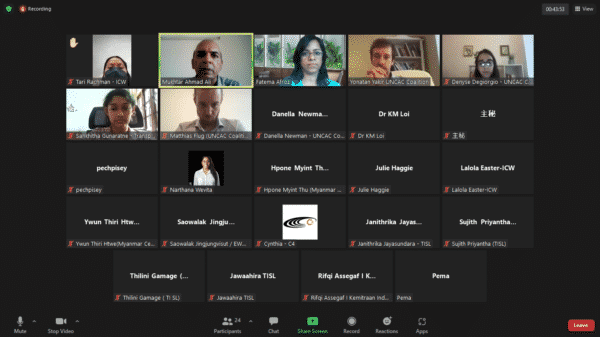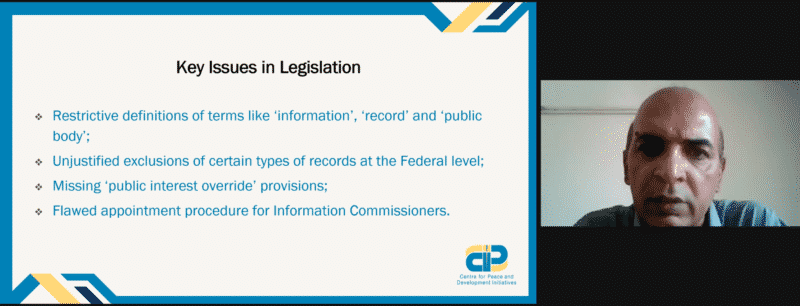27 September 2021 –
The UNCAC Coalition’s third regional meeting of the Asia-Pacific group took place on 15 September, featuring discussions on Access to Information (ATI). The meeting gathered 28 participants including representatives from all over the region, Asia-Pacific members of the Coalition Coordination Committee (CCC), and colleagues from the Coalition’s Vienna Hub. Speakers from Sri Lanka, Cambodia, Pakistan, and the Vienna Hub delivered presentations on the right for ATI followed by a lively discussion with an exchange of information, queries, ideas, and activities.
Unveiling UNCAC: ATI Campaign to Track Transparency in UNCAC Implementation
Denyse Degiorgio, Project Officer at the Vienna Hub, presented the Coalition’s Global Access to Information campaign that had been launched recently and aims for CSOs around the world to use Freedom of Information (FOI) requests, asking their governments to release key documents related to the UNCAC country review process. Also, countries without an RTI law in place can participate in the Campaign, using the UNCAC itself as a legal basis for submitting requests. The campaign is intended to assess the level of countries’ compliance with the UNCAC provisions and includes a request to release documents relating to the country review, namely: the full country report, the self-assessment checklist, contact information of the review focal point, involvement of civil society, and information on follow-up measures to the recommendations countries received in their review. Moreover, the UNCAC Coalition could submit FOI requests on behalf of CSOs requesting them to do so.

Defending the Right to Information: The Sri Lankan Experience
Sankhitha Gunaratne, Member of the Coalition Coordination Committee (CCC) and Deputy Executive Director of Transparency International Sri Lanka (TISL) presented on TISL’S work to promote the Right to Information (RTI) in Sri Lanka. Ms. Gunaratne stressed that RTI requires defending at all stages. Even when the law is in place, there may be a possibility of a stark difference between the spirit of the law and how it is being implemented. Playing a substantial role in the enactment of the RTI law in Sri Lanka as well as raising awareness among the citizens, TISL also plays a vital role in effective implementation of the law such by providing technical support in filing RTI requests, appeal initiatives, and most importantly, oversight to ensure other subsequent laws are consistent with the RTI law. Ms. Gunaratne highlighted the potential of the RTI law to reset the power imbalance between citizens and the state and in this context, emphasized that RTI can normalize the confrontational dialogue between the citizens and the State.
The Long Journey to Cambodia’s Right to Information Act
Pech Pisey, Member of the Coalition’s CCC and the Executive Director of Transparency International Cambodia, presented and updated on Cambodia’s 13-year journey (and counting) to develop an RTI bill. Although civil society has been meaningfully involved in the relevant working groups established to draft the law, the revised draft seems to significantly water down the initial version; for instance, the current draft is neither applicable to all the public bodies nor likely to protect whistleblowers. Moreover, it leaves room for other laws to override the bill. TI Cambodia demanded a revision of the relevant provisions, a demand that has not yet received enough attention. Mr. Pech raised a fundamental question and an ongoing concern shared by many in the anti-corruption community: should local CSOs advocate for the law in its current form, with the hope of finally adopting an RTI legal framework in Cambodia? Or should civil society continue advocating for a revision of the current draft? Mr. Pech concluded by inviting others to share success stories indicating that RTI laws lead to less corruption in other countries.
Status of Right to Information in Pakistan and Challenges in its Implementation
Mukhtar Ahmad Ali, Executive Director, Centre for Peace and Development Initiatives (CPDI), Pakistan, discussed the status and implementation challenges of the RTI law in Pakistan. Pakistan’s constitution did not acknowledge the right to information until 2010 and all the official information was deemed secret by law unless declared otherwise. Although substantial progress has been made including recognition of the right to information as a fundamental right, “reasonable restrictions” can be imposed by law. The RTI laws of Pakistan’s regions differ in quality and significant improvements are needed in the RTI laws at the federal and the provincial level. Mr. Mukhtar added that the CPDI is currently advocating for amendments such as in the restrictive definition of certain terms in the law (such as the term “information”), the unjustified exclusion of types of records at the federal level, as well as the flawed appointment procedure for Information Commissioners. He also pointed out the deeply-rooted culture of secrecy in the civil service that continues to hinder the implementation of RTI and the need to better sensitize the people to use RTI laws across the country.

Assessment of Implementation of RTI Laws
The Regional Coordinator for Asia-Pacific, Fatema Afroz, presented TI Bangladesh’s assessment of the implementation of RTI in the country, through its research initiative on the effectiveness of proactive disclosure of information by the Government and NGOs in Bangladesh. She discussed key indicators of the assessment, such as the extent of the information disclosed, accessibility of information, and the usability of the disclosed information. The research found that much more needs to be done to better implement RTI Laws in Bangladesh in both government and non-government sectors.
The presentations were followed by a discussion among the participants of the meeting. Questions were raised regarding the effectiveness of RTI laws, including on the existence of empirical evidence that could be used by CSOs advocating for an RTI law in their respective country. Other questions focused on ways to better involve CSOs and the general public to put pressure on governments, and how to raise public awareness on negative amendments to RTI laws. The meeting concluded with an invitation to participants working on access to information to continue to share information on the topic.
If you are a civil society activist from the Asia-Pacific region and would like to become involved in the work of the UNCAC Coalition, please contact our Regional Coordinator Fatema Afroz at fatema.afroz@uncaccoalition.org.



